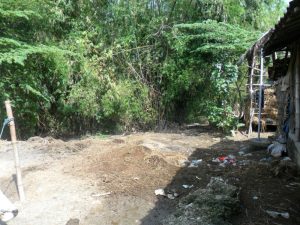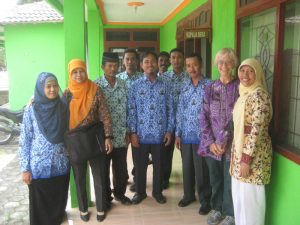Location
Village of Kanorejo, Rengel subdistrict, Tuban district, East Java province, Indonesia
Community Description Kanorejo is a rural village located along the banks of Java’s longest river, the Bengawan Solo. The majority of the villagers are farmers growing rice or vegetables. The government classifies 221 families in this small village as poor.
Kanorejo is a rural village located along the banks of Java’s longest river, the Bengawan Solo. The majority of the villagers are farmers growing rice or vegetables. The government classifies 221 families in this small village as poor.
Problem Addressed
For centuries the villagers have used the spring-fed streams flowing into the Bengawan Solo and the river itself for open defecation, bathing, and clothes-washing as well as irrigation. Many villagers do not have access to any toilet, bathing, or clothes-washing facilities, and they continue this practice. As a result, the villagers suffer from many diseases caused by dirty water.
The Water Sanitation Program (WSP) at World Bank has published several research briefs recently about these issues. In “Factors Associated with Achieving and Sustaining Open Defecation-Free Communities: Learning from East Java”, published in September 2011, a key finding was, “Sanitation behavior change is difficult to ignite in river-bank and waterfront communities and special strategies are needed.”
Project Description
This project is to build public bathing, washing, and toilet facility (MCK) on village public land.
The structure will be built in the neighborhood RT1 RW2, which consists of 50 houses, 20 of which already have private bathrooms. Of the 30 remaining families that have no sanitation facilities, 10 households will use this public facility, and also will provide the labor and share the responsibilities for cleaning and maintaining the facility.
The facility will have walls and a roof and have two private rooms. Each room will have a high-quality ceramic squat toilet and a cement “bak mandi”, which is a large cement tub holding water which is poured over the body when bathing. There will also be an open-roofed area for washing clothes, which will have a faucet and two clothes washing tubs. Wastewater will flow into a septic tank.
The steps will be to first dig a hole and install the septic tank, then set the closets (toilets) into the cement foundation of the building, shape the bak mandi, run the pipes from the water source (already existing) to the bathhouse, and then finish the building walls and install doors.
All the work will be done by the 10 family heads who will be helped by the mayor (kepala desa) and officers of the village, as well as the Peace Corps Volunteer.
 Water Charity funds will be used to purchase materials including cement, sand, the septic tank, sewer pipes, roofing material, small stones, 2 toilets, metal brackets, nails, wire, and 2 galvanized steel doors.
Water Charity funds will be used to purchase materials including cement, sand, the septic tank, sewer pipes, roofing material, small stones, 2 toilets, metal brackets, nails, wire, and 2 galvanized steel doors.
The community is providing all the labor. In addition, the local puskesmas (health clinic) officer in charge of sanitation will co-ordinate her education efforts with the “ribbon-cutting” of the completed facility.
Local students will present a “ludruk” play about good sanitation created by WSP specifically for rural Java. The ultimate goal is for Kanorejo to become an “open defecation-free” village.
Project Impact
Ten families who will use the facility, totaling about 40 people, will benefit from the project.
Peace Corps Volunteer Directing Project
Mary O’Hara
Comments
This project will serve as a model to help persuade other villagers to practice better sanitation, leading to an improvement in the health and wellbeing of the community.
Dollar Amount of Project
$555.00
Donations Collected to Date
$310.00
ADOPT THIS PROJECT BY CONTRIBUTING THE DOLLAR AMOUNT NEEDED BELOW
Donations of any amount will be appreciated. The full amount will give you “naming rights”, if that is something you would like.
Any contributions in excess of the Dollar Amount of the Project will be allocated to other projects directed by this PCV and/or projects of other PCVs in this country.
Dollar Amount Needed
$245.00
![]() This project has been finished. To read about the conclusion of the project, CLICK HERE.
This project has been finished. To read about the conclusion of the project, CLICK HERE.